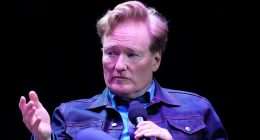
David Jacobs, the writer and producer who changed the face of television in the 1980s by creating the primetime soap operas Dallas and Knots Landing, has died. He was 84.
Jacobs died Sunday at Providence Saint Joseph Medical Center in Burbank, his son Aaron told The Hollywood Reporter. He had battled Alzheimer’s over the years and died of complications from a series of infections.
Dallas in its original incarnation aired for 14 seasons and 357 episodes, starting out as a five-part miniseries in April 1978 before wrapping in May 1991, and it was the No. 1 show in the Nielsen ratings after its fourth, fifth and seventh seasons. Meanwhile, the spinoff Knots Landing debuted in December 1979 and also ran for 14 seasons — and 344 episodes — a solid Thursday night staple through May 1993.
Based on his work as a story editor for the ABC drama Family, Jacobs had scored a deal at Lorimar Productions, where he struck up a friendship with Michael Filerman, a young development executive.
As Jacobs recalled during a 2008 interview for the website The Interviews: An Oral History of Television, he approached Filerman with the idea to do an American version of Ingmar Bergman’s Scenes From a Marriage, expanding it to four couples and setting it in a cul-de-sac.
Filerman told Jacobs to watch No Down Payment, a 1957 drama directed by Martin Ritt about the tawdry, soap opera-type happenings in a Southern California cul-de-sac. The exec thought the movie had just the tone they needed.
“I wanted to do art. He wanted to do trash. And between us, we did television. It was a beautiful partnership,” Jacobs said.
Jacobs wrote a treatment and pitched it with Filerman to CBS. The network liked it but was seeking something to feature Linda Evans, who was under contract. Could they go bigger — create more of a saga? As soon as Jacobs heard the word saga, Texas and its oil industry came to mind.
Over the next few days, Jacobs crafted an outline for a series and gave it to Filerman with a cover that read, “Untitled Linda Evans Project.” Filerman, though, knew CBS wanted more of a feature project for Evans, not the ensemble piece Jacobs had written. So Filerman tore off the cover, retitled it Dallas and sent it to the network. Jacobs was surprised that his partner had done that.
“Dallas! Kennedy was killed in Dallas. I don’t know if I want to do this in Dallas,” Jacobs said. “First of all, Houston is the oil city. Dallas is the banking city. Michael said, ‘Who knows that? Who cares? You want to watch a show called Houston? Well, anyway, we’ll change it later.’”
They never got the chance. CBS immediately ordered a script based on Jacobs’ treatment. When Jacobs turned that in, the network ordered four more scripts. Six weeks after Jacobs penned the pilot, shooting began in Dallas. Six weeks after the miniseries aired, Dallas, starring Larry Hagman as the manipulative oilman J.R. Ewing, had a place on CBS’ primetime lineup.
“Like his ’70’s counterpart, Archie Bunker, who gave voice to prejudices and attitudes that were no longer socially acceptable but still widely felt, J.R. proved unexpectedly appealing,” Jacobs wrote in a 1990 piece for The New York Times. “His unapologetic commitment to self-interest, his unabashed belief in the corruptibility of others linked him to a generation that would soon be told that greed was OK and read on bumper stickers that Jesus wanted people to get rich.”
Jacobs remained a creative consultant on Dallas throughout its run but gave up his day-to-day duties on the show after season two as he focused on creating another hit. During one meeting, the CBS executive to whom Jacobs had pitched the show set in a cul-de-sac brought the treatment out of a desk drawer. He proposed that Jacobs turn it into a Dallas spinoff.
Jacobs did it around the characters of Gary, the second Ewing son, and his estranged wife, Valene. Introduced on Dallas as Lucy’s (Charlene Tilton) parents, they were outside that series’ core characters and wouldn’t disrupt storylines if they left. On Dallas, Gary was played by David Ackroyd and Valene by Joan Van Ark. Because of scheduling conflicts, Ackroyd couldn’t commit to the new show, so Ted Shackelford was cast as Gary.
The spinoff saw Gary and Val reunite and move from Texas to the fictional Los Angeles-adjacent town of Knots Landing and into a neighborhood filled with conflict. More middle class than Dallas — but just as much of a soap opera — it had stories filled with infidelity, corporate intrigue, political ambition, kidnapping, murder and rape.
“The one thing I learned from both of these shows is that if the conflict is in the structure, you make your job much easier,” Jacobs said. “If the conflict is not in the structure, then you have to create conflict. And it is very artificial.”
David Arnold Jacobs was born in Baltimore on Aug. 12, 1939. He described his father, Melvin, as a bookie, billiards champion, crooner and songwriter, and his mother, Ruth, as the woman who “took him away from all that.”
Jacobs’ dad drove a cab, sold insurance and worked in a lamp factory. It made him miserable, and that left a lasting impression on his son. “He went to work every day to something that he hated,” Jacobs recalled. “At some point I said, ‘I’m never going to do that. I’m never going to go to work hating what I do.’”
After struggling in high school, he enrolled at the Maryland Institute College of Art to pursue his passion for painting. “Everything good that happened to me started then. I just loved it,” he said.
Jacobs quickly realized he wouldn’t make it as an artist and refocused on writing. Until then, he had never taken that seriously because it had come so easily to him. He would write about the world he loved.
He earned a master’s in art history at Hunter College in New York and landed a steady gig writing biographies for The Book of Knowledge, and Viking Press published his first book, Master Painters of the Renaissance, in 1968.
Making architecture his specialty, he wrote for Esquire, Holiday and The New York Times Magazine, worked as a story editor for American Heritage and covered the art scene for Newsweek. He wrote another book, 1975’s Chaplin, the Movies & Charlie.
When the economy took a downturn and magazine opportunities decreased, he tried his hand at fiction, selling short stories to Redbook and Cosmopolitan.
During that time, Jacobs’ marriage to Lynn Oliansky, whom he had married in 1963, was ending amicably. In 1975, she announced she was marrying actor John Pleshette and moving with him to Los Angeles. (Pleshette would portray Richard Avery on Knots Landing.)
Lynn intended to become a writer’s agent in Los Angeles. Wanting to stay close to their daughter Albyn, Jacobs was willing to follow them west but insisted that his ex-wife get him work.
Jacobs’ writing served as his calling card into TV. “I had never planned it that way, but writing for magazines is the perfect apprenticeship for television,” he said. “You have to build the character fast, and you have to write dramatically. The nonfiction helped with the size and the technical restrictions, and the fiction got me into the kind of storytelling that you need in television.”
After doing a rewrite on a script for the CBS procedural Delvecchio that a producer threw it in a trash basket, Jacobs caught a break in 1977 when his ex got him an opportunity to rework a story for the CBS cop series The Blue Knight.
Jacobs excitedly rewrote it during Labor Day weekend, turning it in that Monday night. When he was called into the production office, he was expecting to receive notes. Instead, he was told his script was being prepared for production and he was wanted as a story editor.
The job ended a month later when The Blue Knight was canceled. But with the momentum it gave him, he landed on Family as story editor. Shortly thereafter came the offer from Lorimar and his partnership with Filerman.
Jacobs liked to boast that he wrote the first five Dallas scripts without visiting the title city. “I thought, ‘Well, I’ll just write it. I don’t have time to get away,’” he said. “So I’ll just write it very stereotypically — with stereotypes — and then I’ll go and visit and pull it back. And then I went to Dallas and realized I had to take it way further. There is something about Dallas and about the people in Dallas that I can only describe as extravagant, but not ostentatious.”
Jacobs believed the series caught on because it typified the money obsession and excesses of the 1980s. “Dallas represents the beginning of an era which is ending this year in 2008 in which all of our values as a people have been terribly screwed up,” he said. “I think Dallas was trying — at least in my head and heart — to show that. It was never trying to glorify that world.”
Jacobs was in the loop for 1980’s “Who Shot J.R.?” cliffhanger but didn’t take part in its conception. He said he hated the plan to resurrect Bobby Ewing (played by Patrick Duffy) a year after the character had been killed off and write off an entire season as a dream. “I thought it would negate the emotion of Bobby’s death,” Jacobs said. “People have a very willing suspension of belief, but they don’t want to be jerked off too much.”
He also wrote and produced the 1986 telefilm Dallas: The Early Years, which showed how the Ewing-Barnes feud began.
Jacobs was much more hands-on during Knots Landing‘s long run, trying to keep the series that starred Van Ark, Michele Lee and Donna Mills as “middle class” as possible.
“Because its characters remained downscaled and multidimensional, viewers felt they were along for the ride,” he wrote in his 1990 Times piece. “The pleasure of watching Dynasty and Dallas and Falcon Crest was voyeuristic; the pleasure of watching Knots Landing was vicarious. Dynasty and Dallas and Falcon Crest were about Them. Knots Landing is about us.”
For CBS, Jacobs also co-created Paradise, a Western that ran for three seasons (1988-91), and created Four Corners, which lasted five episodes in 1998. He also executive produced ABC’s Lois & Clark: The New Adventures of Superman and Homefront, getting two Emmy nominations in 1991-92 for his work on the latter.
In addition to kids Aaron and Albyn, survivors include his second wife, Diana; daughter Molly; and grandchildren Riley and Georgia.
Source: Hollywood








